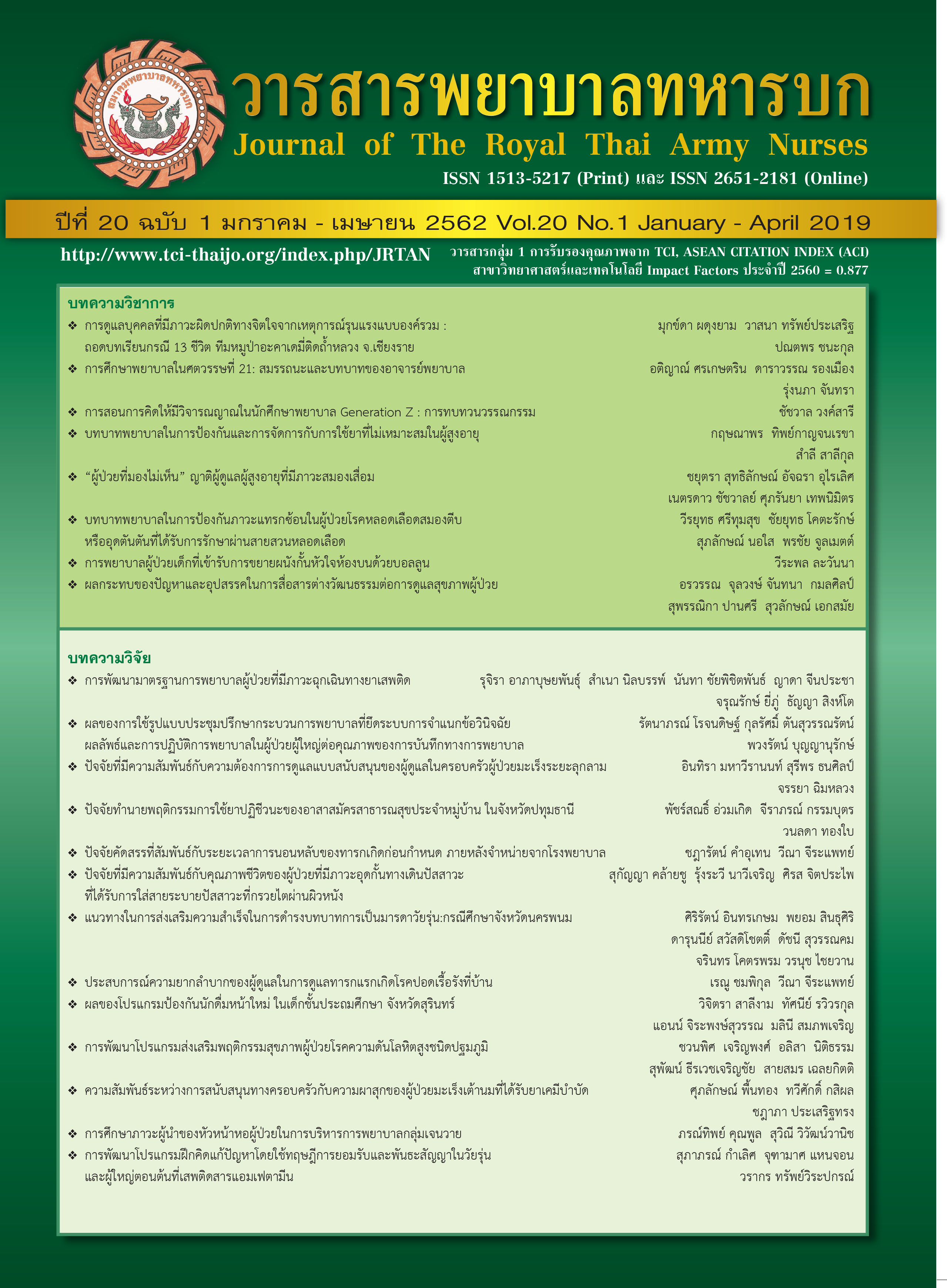The Developed Health Education Program Applying Self-care Theory in Hypertension
Keywords:
health education program, behavior of hypertension patient, knowledge of hypertension, self careAbstract
The objective of the research & development was to develop health education program for hypertensive patients by applying self-care Theory. The instruments for collecting data were general information query, selfcare knowledge and behavior questionnaire. Sphygmomanometer was used. Data collected before and after using the program for 2 weeks. The samples were 30 hypertensive patients which had high blood pressure (systolic ≥140 mmHg. and diastolic ≥90 mmHg.) Data analyzed by dependent t-test. The study found that Health Education Program composed health education teaching for create knowledge and change behavior about self care on having meal, exercise, stress relief, stop or reduce smoking, alcoholic drinking, correct medication and appointed examination in order to reduce complication of the stroke. Moreover after used the program, samples had higher average scores of self care knowledge and self care behavior with statistical significance at the level of 0.05.
Downloads
References
Hypertension Association of Thailand. Hypertensive Care Guideline in General Medicine. Bangkok: Huanam Printing Limited; 2012. (in Thai)
McEwen, M., & Wills, E.M. Theoretical Basis for Nursing 4th ed. Philadelphia: Lippincott; 2014.
Navejareon R. Hypertension. Bangkok: Ammarinsukkaparb; 2009. (in Thai)
Srilaruk S., Chotmongkol R., Chumjaun S., Chantha D. Citizen Guideline for Hypertension and Diabetes. Khon Kaen: Klung Nana Printing; 2009. (in Thai)
Wongvichean M. Hypertension. Bangkok: ReaderDigest; 2010. (in Thai)
Theanthawon W. New Health Promotion. Bangkok: Veterans Relief Organization; 2012. (in Thai)
Sitthichai Archayindee. Basic Knowledge in Manual Providing Self Care on Hypertensive Management. Bangkok: Veterans Relief Organization; 2013. (in Thai)
Giuseppe M, et al. Guidelines for the Management of Arterial Hypertension the Task Force for the Management of Arterial Hypertension of the European Society of Hypertension (ESH) and of the European Society of Cardiology (ESC). Geneva: World Health Organization; 2007.
World Health Organization. International Society of Hypertension. European Heart Journal. 2003; 28: 1462–1536.
World Health Organization. A Global Brief on Hypertension. Geneva: World Health Organization; 2013.
Bloom B.S. Human Characteristic and School Learning. New York: McGraw –Hill; 1976.
Suntawacha C. Basic Concept Theories and Nursing Process. Bangkok: Thanapress; 2005. (in Thai)
Chanmoree S. Health Strategy. Bangkok; Pimluck; 2010. (in Thai)
Cronbach, lee J. Essentials of Psychological Testing. New York: Harper Collins; 1990.
Supimol P. The Result of Health Education Program for Hypertension of Risk Group on Age 35-59, Songdao District, Sakonakorn Province. Office of Disease Prevention and Control 7, Ubon Ratchathani Province. 2009; 7 (3): 28-40.(in Thai)
Downloads
Published
How to Cite
Issue
Section
License
บทความหรือข้อคิดเห็นใดใดที่ปรากฏในวารสารพยาบาลทหารบกเป็นวรรณกรรมของผู้เขียน ซึ่งบรรณาธิการหรือสมาคมพยาบาลทหารบก ไม่จำเป็นต้องเห็นด้วย
บทความที่ได้รับการตีพิมพ์เป็นลิขสิทธิ์ของวารสารพยาบาลทหารบก
The ideas and opinions expressed in the Journal of The Royal Thai Army Nurses are those of the authors and not necessarily those
of the editor or Royal Thai Army Nurses Association.






